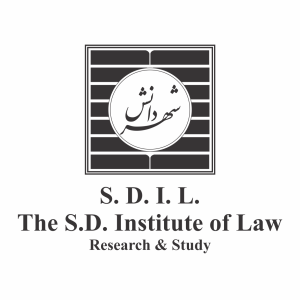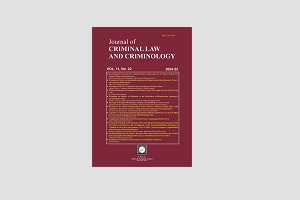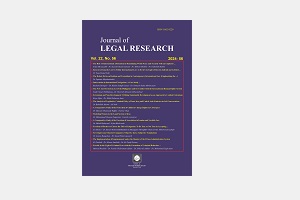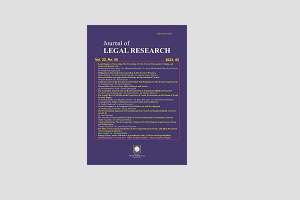Journal of
Criminal Law and Criminology
Number 14
Vol. VII ● No. 2
Autumn – Winter 2019
Managing Editor: Vahid Eshtiagh
Editor-in-Chief: Mohammad Ashoori
CONTENTS
Comparative Study of Stop and Search by Police in Public Places in Iran and England Legal Systems
Dr. Gholamhassan Kooshki & Peyman Dolatkhahpashakie
Liability of Vehicle Owners against Third Parties such as Civil or Criminal Liability? “Theory of Risk in the Law of Iran from Appearance till Wane and the Evolution of Responsibility of Vehicle Owners”
Dr. Nasroallah Jafari Khosroabadi & Mina Salemi
Heading a Criminal Gang and Aggravation of Punishment
Dr. Mansour Rahmdel
“Invention” of the Custom or Only a “Transformation” in the Way of Recognition? (Resort to Uncertain Custom in International Criminal Law)
Dr. Alireza Bagheri Abyaneh
Analyzing the Content of Kimia TV Serials from the Perspective of Family Violence
Rabeae Nazarpour Hamedani & Dr. Batoul Pakzad
Basics and the Realm of the Teachings of New Penology on the Juvenile Delinquency; with an Adaptive Approach to the Criminal Justice Systems of Iran and the United States
Ali Davoudi Salestani & Dr. Seyyed Hossein Hashemi
The International Documentary Approach to the Victims of the Crime of Forced Disappearance
Dr. Jamal Beigi & Hiva Alipour
Right Realist Criminology, Backgrounds and Looks
Dr. Gholamreza Mohammadnasl & Dr. Nader Norouzi & Ayoub Nourian
International Organizations Participation in Preliminary Examination in International Criminal Court
Sahar Poorhassan Ziveh & Dr. Seyyed Ebrahim Ghodsi & Dr. Hamidreza Javidzadeh
ABSTRACTS
Comparative Study of Stop and Search by Police in Public Places in Iran and England Legal Systems
Dr. Gholamhassan Kooshki
Assistant Professor, Department of Criminal Law and Criminology, Faculty of Law and Political Sciences, Allameh Tabataba’i University, Tehran, Iran
&
Peyman Dolatkhahpashakie
Master of Criminal Law and Criminology, Faculty of Law and Political Sciences, Allameh Tabataba’i University, Tehran, Iran
Abstract:
Protecting public and community rights, justifies using the search and stop order in some cases, especially in public places. The principle of limiting search and stopping recognized, in both legal systems. The judiciary in Iran must obtain a judicial authorization, except in the case of evident crimes. In the UK, police officers based on reasonable suspicion and sufficient information allowed to search and stop and obtaining a legal authorization is necessary in other cases. In the UK it’s anticipated clear rules for pre-search such as the announcement of the search purpose and the law and circumstances invoked, for search such as respect and determine the scope of search and for after search such as necessity and or no need for arrest and the quality of maintenance of objects. Guarantee of civil, disciplinary and criminal proceedings is considered in both legal systems, however these guarantees predicted more precisely, clear and wider In England.
Keywords: Stop, Search, Police, Public Places, Iranian Law, English Law.
Liability of Vehicle Owners against Third Parties such as Civil or Criminal Liability? “Theory of Risk in the Law of Iran from Appearance till Wane and the Evolution of Responsibility of Vehicle Owners”
Dr. Nasroallah Jafari Khosroabadi
Assistant Professor, Department of Law, Meybod University, Meybod, Iran
&
Mina Salemi
Master of Private Law, Faculty of Law and Political Sciences, Allameh Tabataba’i University, Tehran, Iran
Abstract:
Based on the theory of risk and legislated compulsory insurance of motor vehicles approved in 1347, holders of these devices on the civil liability losses were victims of traffic accidents but the reforms with contradictions and ambiguities in 1387, in this type of civil liability, insecurity and doubt was created. And finally, with the adoption of mandatory insurance law passed by the legislature in 1395 doubts had been dispelled and a certain type of criminal responsibility was replaced by former civil liability. Denial of civil liability of owners of vehicles means the decline of the theory of risk in Iranian legal system. In this study, with an emphasis on innovation, Mandatory Insurance Law in 1395 to analyze developments liability of owners of vehicles and different perspectives will be discussed.
Keywords: Owners of vehicles, Compulsory Insurance, Theory of Risk, Iran Law, Civil Responsibility.
Heading a Criminal Gang and Aggravation of Punishment
Dr. Mansour Rahmdel
Faculty Member, Faculty of Law, Islamic Azad University, Central Tehran Branch, Tehran, Iran
Abstract:
Leading a criminal gang is one of the personalized factors of aggravation of the punishment. It means that the legislator aggravates the punishment of the some perpetrators which have such a personalized factor. Note 2 of the article 130 of the Iranian Islamic Penal Code refers to the examples of leading a gang, without defining leading a gang. According to it Leadership is defined as forming, or planning, or organizing or directing a criminal gang. So it seems that a criminal gang could have more than one leader. For example, one of them forms, the other one plans, and the third one organizes and the fourth one directs the criminal gang. Typically, planning is prior to other forms of leadership. It seems that a leader orders others and they obey his orders. It is noteworthy that the committed crime by the members of the gang should be in line to the gang aims, otherwise it could not be regarded as a crime committed by the gang. The current paper is going to answer the following questions: what is the substance of leading a gang? Aiding and abetting or accomplishment? Is it necessary for the leader to participate in material element (actus reus) of the crime? How the punishment determined for members influences the punishment of the leader? What does an organized criminal gang mean? The method of research is an analytical one.
Keywords: Leading a Gang, Aiding and Abetting, Accomplishment, Organized Criminal Gang.
“Invention” of the Custom or Only a “Transformation” in the Way of Recognition? (Resort to Uncertain Custom in International Criminal Law)
Dr. Alireza Bagheri Abyaneh
Ph.D. in Public International Law, Assistant Professor, Payame Noor University, Iran
Abstract:
The traditional way for recognizing of international customary law by an international court was based on finding out two factors: “the state practice” as well as opinio juris. Nowadays this traditional way is changed by international courts and these courts do not consider “state practice” as a main factor for recognition of international customary international law. Jurists opponent to this approach mention that using this way is illegal and can be regarded as “inventing customary international law by a court” and therefore is beyond the delineation of the judges duties. On the other hand, the advocators express this approach as an evolution in international law so that a court can find out an international customary law without paying too much attention to “state practices”.
in international criminal law, using of the traditional way for recognizing the international customary law does not take place, especially in some tribunals such as ICTY because of security council resolutions.
in addition, some international criminal tribunals have also diminished their resort to “state practice” for recognizing international customary law by considering “martens clause”, “human rights” and even decisions of political bodies of international organizations instead of using state practice. This approach has been used in second generation of international criminal tribunals for many times.
Keywords: International Customary Law, State Practice, Invention of Customary Law, Transformation.
Analyzing the Content of Kimia TV Serials from the Perspective of Family Violence
Rabeae Nazarpour Hamedani
Ph.D. Student in Criminal Law and Criminology, Islamic Azad University, North Tehran Branch, Tehran, Iran
&
Dr. Batoul Pakzad
Assistant Professor, Islamic Azad University, North Tehran Branch, Tehran, Iran
Abstract:
TV series are the determinant factors in the field of educational and legal discourse in society and the deep linkage with policy to deal with social deviations, script and dialogues may be a serial. The fact that it is the same as the dual function of the media can also be the cause of the crime or the underlying cause of its decline preventing cultural development and preventing harm, such as family violence, may also help the factors of its occurrence and its expansion in society.
Serial discourse analysis is a desirable way of studying the correct understanding of the level of violence. Dedication of media activities. In this paper, the qualitative method of this objective has been followed, which is evident screening of family violence is highlighted in the Kimia Social Series, in the series 36 violent.
Families were found to have the highest rate of verbal violence with 60 cases.
Also, the findings indicate that the series of cases of domestic violence with which research different statistics have been done in this field and the discourse of characters has been sought or unwanted, from theories of cultural background, resources, control and capture.
Keywords: Family Violence, Media, Kimia Series.
Basics and the Realm of the Teachings of New Penology on the Juvenile Delinquency; with an Adaptive Approach to the Criminal Justice Systems of Iran and the United States
Ali Davoudi Salestani
Ph.D. Student of Criminal Law, Islamic Azad University, Qom, Iran
&
Dr. Seyyed Hossein Hashemi
Assistant Professor and Faculty Member of Criminal Law and Criminology, Mofid University, Qom, Iran
Abstract:
The new penology teachings classify offenders to punish based on criteria such as crime risk and community security. The purpose of applying such teachings is management of the cost-effectiveness in enforcing legal penalties that impose a dual policy of strict and alternative punishment. The present study conducted on Adolescent Juvenile Delinquency, based on the legal and judicial data of Iran and The United States of America. The obtained results indicate that the criminal justice system of Iran has been functionalize by using the cost-benefit management model as an innovative measure of the new penology teachings in order to eliminate punitive and delinquent labeling of juvenile offenders. However, the US criminal system seems to be leading in strict monitoring of the behavior of juvenile offenders after committing crimes and simultaneously enforcing judicial measures. Our studies have shown that juvenile delinquency attributed to the threatened and colored people by virtue of the rule of retributivism and labeling, as well as the privatization of criminal justice in US has resulted in the use of de-deductible privileges from new penology has been largely deprive of justice. Our final study showed that the purpose of the Iranian criminal justice system in applying the teachings of new penology is classifying the perpetrators with a view to avoiding the maximum financial and social costs of imprisonment, as well as the reform and socialization of adolescents. The transformation, along with inherent functionalism, faces challenging aspects such as Penal populism and security-oriented in the interpretation of risk criteria.
Keywords: New Penology, Actual Justice, Juvenile Delinquency, Iranian Criminal Justice System, American Criminal Justice System.
The International Documentary Approach to the Victims of the Crime of Forced Disappearance
Dr. Jamal Beigi
Assistant Professor, Department of Criminal Law & Criminology, Maragheh Branch, Islamic Azad University, Maragheh, Iran
&
Hiva Alipour
Ph.D. Student in Criminal Law & Criminology, Maragheh Branch, Islamic Azad University, Maragheh, Iran
Abstract:
Compulsory disappearance is a Continuous and Combined crime against humanity that undermines individual freedoms and deprives the victim of the right to legal protection; mostly these deprivations ultimately lead to the killing or physical and psychological harassment of individuals. Over time, we have seen many examples of this crime, which has often been committed by political, religious or racial issues. Given the depth of the damage done to the victim of this crime, the human rights organization and institutions have made it, in addition to paying attention to the rights of the victims of this crime, in its documents and treaties, ways to deal with it and return them at least the rights of the victimized group. The importance of the crime of forced disappearance, perpetration of this crime is also a matter of concern for every ordinary person, therefore, in this research, we tried to emphasize the descriptive-analytical method and the use of library resources while expressing the concept of the disappearance of the rights of the victims of the crime.
Keywords: Forced Disappearance, Crimes against Humanity, Convention, Victim, Crime.
Right Realist Criminology, Backgrounds and Looks
Dr. Gholamreza Mohammadnasl
Faculty Member of Amin Police University, Tehran, Iran
&
Dr. Nader Norouzi
Assistant Prof. of Law Department, Faculty of Law, Islamic Azad University, Central Tehran Branch, Tehran, Iran
&
Ayoub Nourian
Ph.D. Student of Criminal Law and Criminology, Faculty of Law, Islamic Azad University, Central Tehran Branch, Tehran, Iran
Abstract:
Serious and bold presence of right realist criminology thoughts undoubtedly cannot be denied in the field of penal thought. Today’s in many western countries, these thoughts have given life again to punitive penal policy as an efficient model, through induction of inefficient of preventive policies and penal populism. The paper makes effort to review and retest foundations and those defaults stemmed from the approach and considers as obvious in the light of criminology and penal thoughts, through library tools prepared. The results show this claim by right realist criminology with more realistic perspective towards causes of crimes and deviations takes advantage of those concepts and propositions which are clearly observable in previous studies of penal schools of thoughts and criminology. The necessity of this study, in addition to the existing poverty of the realistic criminology literature, emanated from the role and functions of this approach in the life, evolution and dynamics of criminal thought. The main question is what are the main areas and effects of the trend towards realistic criminology and its revitalization?
According to the research findings, right realist criminology is rooted in many factors, from among which reference could be made to a set of political, economic, and Criminological factors playing fundamental role in formation and continuations of programs and goals followed by the theory.
Keywords: Realism, New Right, Rational Selection, Order and Law, Punitive Penal Policy.
International Organizations Participation in Preliminary Examination in International Criminal Court
Sahar Poorhassan Ziveh
Ph.D. Student in Department of Criminal Law and Criminology, Islamic Azad University, Semnan, Iran
&
Dr. Seyyed Ebrahim Ghodsi
Associate Professor, Department of Criminal Law and Criminology, Faculty of Law and Political Sciences, University of Mazandaran, Mazandaran, Iran
&
Dr. Hamidreza Javidzadeh
Assistant Professor, Department of Criminal Law and Criminology, Islamic Azad University, Karaj Branch, Alborz, Iran
Abstract:
International organizations as one of the effective subjects of international law have varied functions in different international issues. Organizations participation in ensuring realization of criminal justice has been evolved with establishment of International Criminal Court. International Organizations participation in trail procedure by providing information is one of the mechanisms that can be effective in realization of criminal justice. This article aims to study the feasibility of effect of international organizations in fulfilment of international criminal justice. With descriptive analytical method and by reference to court jurisprudence it answers to these questions: what is the role of international organizations to initiate of the criminal procedure in preliminary examination phase? How are the participation mechanisms of international organizations in judicial review in Prosecutor’s decisions? And assuming this participation, what is the role of these organs in fulfilment of international criminal justice?
The results of this study show that the rules of Court in innovative manner have provided the International Organizations participation in preliminary examination phase. At this phase, on one hand International Organizations trigger the prosecution and prepare the basis of preliminary examination by providing information, and on the other hand, establish the basis of judicial review in Prosecutor’s decisions to proceed or not to proceed the investigation. This article studies how organizations can affect the trigger of prosecution and judicial review in Prosecutor’s decisions at preliminary examination.
Keywords: International Organizations, International Criminal Court, Preliminary Examination, Judicial Review, Criminal Justice.





